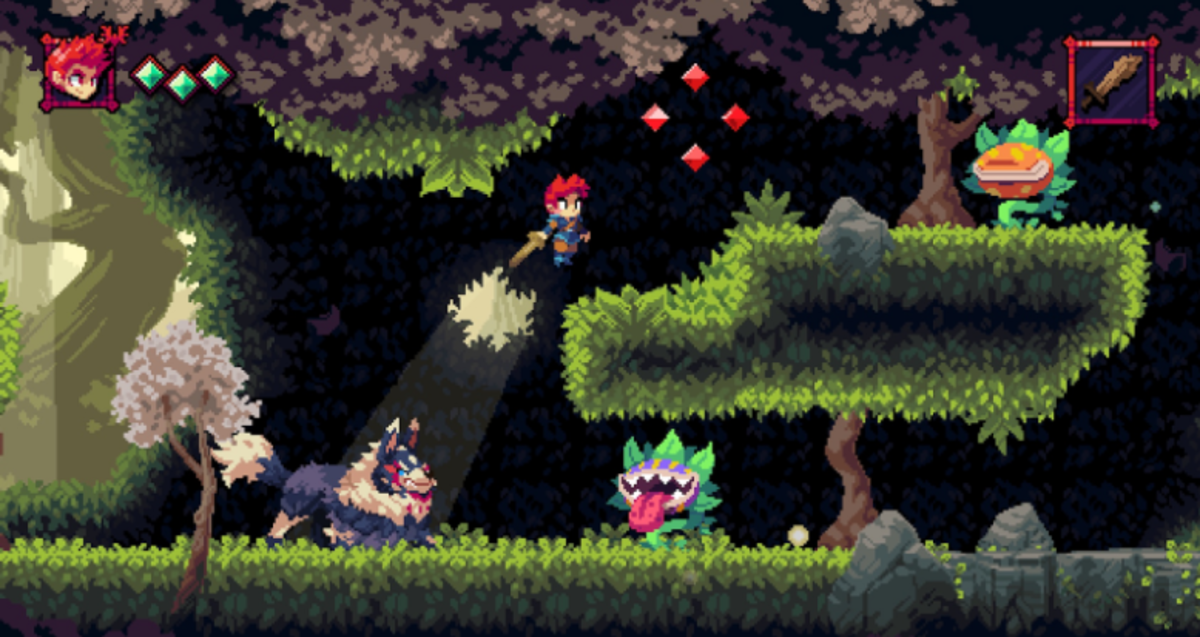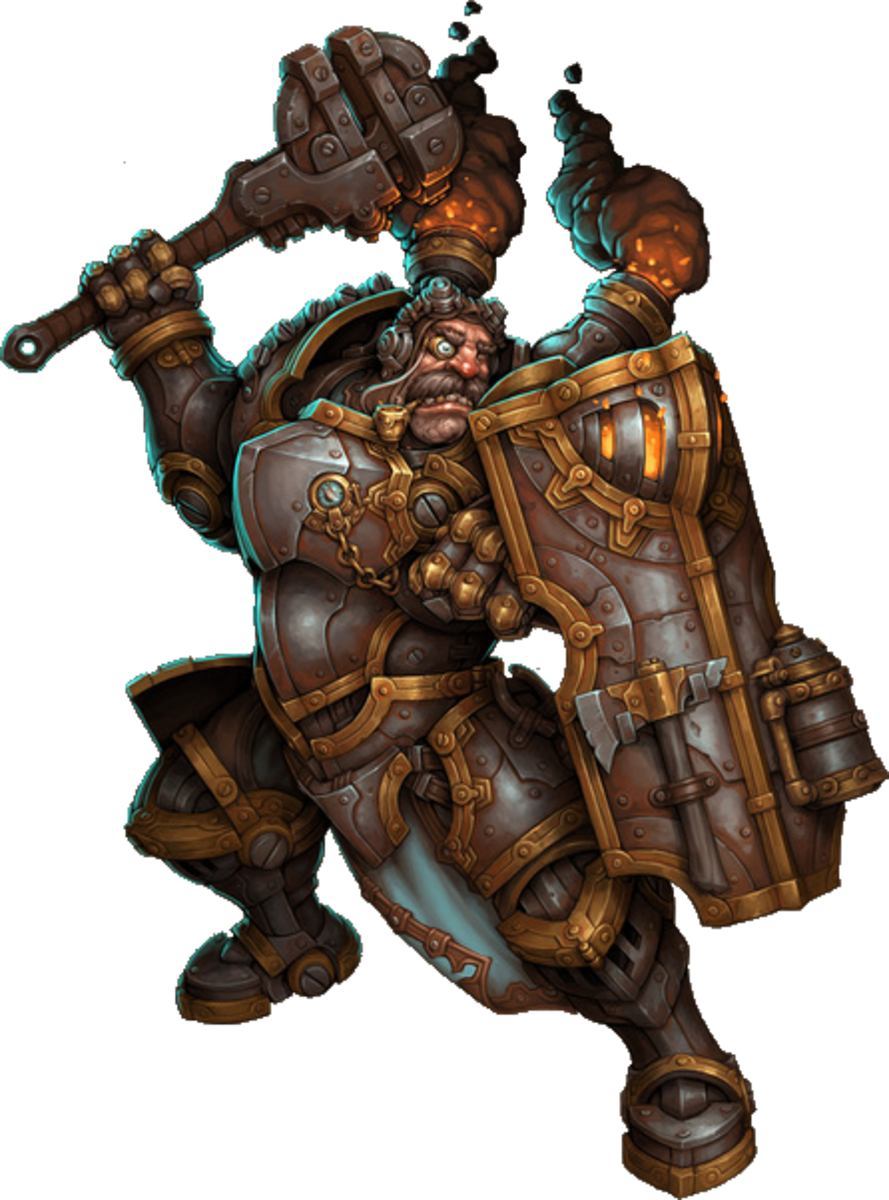How to Make Video Games, Part 1: Pick Your Class!

Warning!
You hear a lot about video game addiction these days and I'm here to tell you that there's something out there that just might be worse: making video games. Industry professionals even have a special name for game dev binges: crunch time. Seriously, I have to tear myself away from learning about this stuff just to spend time playing! If you don't want to become addicted to learning, stick to playing the games!
Game design is a huge subject and hard to condense into easily digestible chunks. When you're first starting out, it can be hard to know where to begin and what your best course of action is. In this series, I've taken a fairly common and well-understood game mechanic and applied it to the study of game design. Using the concept of classes as an analogy for game design paths allows us to divide the overwhelming welter of topics into a system of coherent, digestible sub-categories that flow logically and make sense.
Anyone who's played a lot of video games is probably already familiar with the concept of a character class. A class is a specialization or character type that defines how your character progresses through the game world. Different classes have different strengths and weaknesses, different skill sets, and different development paths but they all lead to a build that can succeed in the game environment. Surprisingly, this concept also works very well for describing how different people with different backgrounds and personality types approach the challenge of video game design.
It is important to understand that one path is not better than another as far as the long-term objective of designing a game goes: sooner or later, each one of these paths will lead you to a finished game that you can be proud of and that might just make you some money. Each path is suited to a different personality type, however, so knowing your own resources and limitations is important when deciding how to go about pursuing your dream job. These paths each have different requirements and will result in the development of different (though related) skills.
The first, the Visionary, tends to focus on the design at a high level, concentrating on narrative, art direction, gameplay, and project management. The second, the Career Gamer, tends to focus on acquiring specific skills that allow them to work as part of a team: modeling, texture art, animation, and sound design. The third, the Hacker, tends to focus on the design at a low level, resolving complex technical issues like rendering, networking, and AI. These paths are not hermetically sealed--people can and do frequently fluctuate between two or more paths in their attempt to solve specific game development challenges--but understanding the paths will help you to make sense of much of the contradictory advice that you may receive in your own endeavors.
Moar Warnings!
Since I'm planning on writing a series of tutorials, I figure its only fair to let you know who you're dealing with. If nothing else, it will confirm your suspicion that just about anybody can write a hub about anything these days.
So What's My Story?
I have been interested in video games for as long as I can remember but I never seriously considered pursuing them as a career path until about a decade ago. I enjoyed playing them on occasion but I never thought for one second that I had 'what it takes' to be a professional game designer. After all, I dropped out of math and science courses midway through high school and video games are all math and science, right?
I came to video game design by way of writing. I have been reading and writing fantasy for most of my life but I always ran into difficulty when it came time to describe something: I could never get the words to perfectly capture the fantastic images that filled my imagination. It was a constant source of frustration for me and almost always resulted in me giving up on my writing. One day, while playing a video game, I thought to myself: I wish I could make people see what I see in my imagination the way that these developers made me see what they had in theirs.
At first I didn't think very much of it but over time the idea grew stronger and stronger and started to dominate my thinking. The only problem was: I didn't know where to start. I didn't know the first thing about making video games and I had no idea where to find out more. Back then, there wasn't nearly as much information about making video games as there is now and there were only a couple of ways you could really do it. At the time, the only clear path seemed to be to learn how to program and design a game from the ground up.
Ten years later, I can honestly say that I've learned a lot. I'm not a professional game developer, but I've been studying games, making mods, and learning about the game industry long enough to feel that I can help one or two other people get started. Hopefully, with a bit of direction, you can avoid a lot of the false starts and wrong turns that I took when I started learning how to make video games.

"How Do You Make Video Games?"
The question: "How do you make video games?" is one of those questions that defies an easy answer. There are so many different types of video games now, and so many different ways to make them, that you can't really answer it by laying down a single series of steps.
It was in pondering how to answer this question that I made the connection between game developer personality types and character classes. Before you can even start learning how to make a game, you have to know what your goal is. By identifying your objectives, you can narrow down your choices and get yourself on the right path.
In my experience, there are three general personality types that get involved in game design.
The Visionary
The Visionary starts out with a healthy amount of inspiration and ambition but usually little in the way of useful ability. These are the 'idea men' that post 'help wanted' ads on internet forums and get flamed for being ignorant and naïve. Often, Visionaries appear to be young and inexperienced, but that's a misleading impression. Being a Visionary isn't something you grow out of; it's something you grow into, and one of the first things that Visionaries learn to do is keep quiet. The Visionaries are still there, working patiently in the background, finding ways to turn their dreams into reality.
Visionaries are good at finding alternative ways to solve problems. If the problem is game design, the solution is finding the best tools to accomplish the most work with the least amount of effort. Visionaries spend a lot of time surfing the web comparing existing technologies, reading reviews, and asking questions. These are the people who have tried every game engine ever released.
Although Visionaries typically consider themselves designers first and foremost, they often have other skills that are relevant to game design. Many Visionaries start out as writers, artists, and musicians and become interested in video games as a new medium of expression. That's something to think about when you're dealing with a Visionary if you're not one yourself. It's easy to dismiss a Visionary's ignorance about the complexity of game mechanics as a sign of incompetence or stupidity but they may very well be veterans of another discipline where the tables are turned. If you criticize them for wanting to make an MMO before they've finished a Tetris clone, don't take umbrage if they happen to point out that your game narrative is populated with Mary Sues, your character concept wouldn't know a good silhouette if it bit him in the behind, and your musical score is not only not epic but downright cringe-worthy.
Most Visionaries end up in the modding community sooner or later, which is like an open internship for the game industry. Established mod teams are very similar to professional studios but on a much smaller scale. Team leaders learn how to be game designers and producers, how to recruit talent, how to manage a team and keep it on track, and how to market and distribute their final product. More importantly, they learn how to sell an idea. These are the people that get passionate about a game design and sell it to potential investors, publishers, and fans.
The Career Gamer
The Career Gamer starts out somewhere between a Visionary and a Hacker. Career Gamers play games because they love them and want to get into the gaming industry so that they can keep playing games and get paid for it. They usually have a better understanding and appreciation for the relationship between education, employment, and paychecks and don't mind putting in the hours at school, working on their portfolios, and sending out resumes to get their dream job.
Career Gamers can be highly motivated, talented, and articulate. They don't differ from Visionaries and Hackers in terms of ability, but perspective. Career gamers tend to be much more practical and goal-oriented than Visionaries and much more flexible and team-spirited than Hackers. If you fall into this category, you are going to have an easier time getting into the industry and making connections than the other classes so you can be optimistic about your future.
Career Gamers tend to have a much more 'by the book' approach to game design and development, taking established practices and rules of thumb to heart. They might lack some of the inspiration of a Visionary, and some of the mad genius of a Hacker, but they make up for it with solid skills and a sound work ethic.
Because Career Gamers spend a lot of time playing games, they are usually very good at spotting design flaws and they won't hesitate to point them out. They like to talk about their favorite games and how they could make them better and about their least favorite games and why they fail on a number of levels.
Career Gamers also tend to have a broader awareness of current trends and are often more game literate. They don't waste time reinventing the wheel because they already know about most of the wheels in existence and are happy to take advantage of them.
The Hacker
The Hacker starts out with a firm understanding of the way computers and programs work. These are the people that build their own computers, code their own web pages, and argue over the proper use of braces. Hackers have a better understanding of how games work under the hood than either of the other classes and are more likely to be impressed by an innovative feature than a good overall design. They enjoy programming, coding, and scripting and take pride in their ability to 'do' math and physics.
Hackers tend to be very highly motivated, but narrowly focused. These are the people who spend eighteen hours in front of a computer reverse engineering code in a hex editor or writing custom exporters for other people's applications. Their chief satisfaction in game design comes from solving difficult problems and writing elegant and efficient code.
Hackers tend to be good at discovering better ways to do things. They are incredibly valuable to game studios as experts and innovators but aren't always easy to get along with. They don't need to be prodded to work as they tend to fixate on problems obsessively and sit motionless at their desks for hours at a time trying to solve particularly thorny problems. For hard core hackers, crunch time is just ordinary time shared with other people. Hackers have no problem reinventing the wheel if they think they can come up with a better wheel.
Hackers, once they get over their inherent aversion of working with others, tend to be in high demand in the game industry and are usually well paid for their services. If you're a Hacker and game design doesn't work out for you, there will be plenty of other companies out there willing to pay top dollar for your skills.
Multiclasses
Nobody is an ideal Hacker, Visionary, or Career Gamer. These classes are stereotypes that help you think about the different ways that people approach game design. If you know why you want to make games, and what motivates you to take action, then you can plan your strategy effectively without becoming confused by the enormous number of choices that are available.
Each of these personality types is important to the success and health of the game industry as a whole, and, if you're like me, you can probably see a little bit of yourself in each of these classes (I tend to alternate between the Visionary and the Hacker). Understanding these different personality types can help you understand your fellow gamers and build a foundation of mutual respect and cooperation.
But the best news is that there are legitimate career paths for each of these types. If you're a Visionary, for example, you don't necessarily have to go to school to become a game developer. Plenty of good developers got their start by modding games. Many of them go on to be indie game designers but some of them get picked up by large studios. The same goes for Hackers. If you can build your own toolsets you've already got a leg up on graduates who have a lot of theory but little practical experience. The great thing about the game industry is that it rewards ability above credentials.
Next in This Series
In the next three hubs I talk about each of these three classes and the three different paths that they take toward the goal of becoming a professional game developer: The Visionary, or the modder's path, The Career Gamer, or the academic path, and The Hacker, or programming path.
These articles cover a lot of the topics you see posted about getting into the industry: game testing, game schools, demo reels, the application process, the best programming languages to learn, the best tools to use, the importance of math and science and many other things you are probably curious about. Once these initial topics are out of the way, the fifth segment will dig into the process of actually designing the video game: brainstorming, concepting, prototyping, and other preproduction topics.







